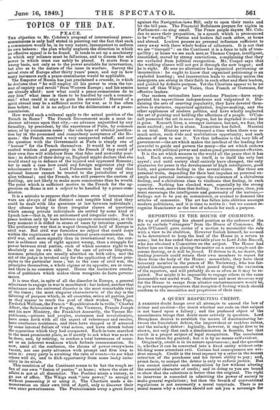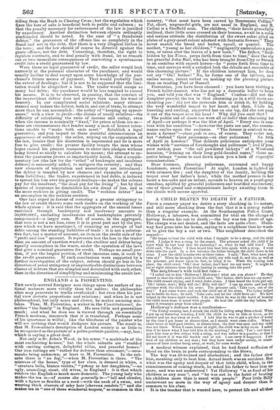A QUERY RESPECTING CREDIT.
A SERIOUS doubt hangs over all attempts to amend the law of debtor and creditor—the doubt whether our code on that subject is not based upon a fallacy ; and the professed object of the amendments brings that doubt more actively in question. Lord Brougham desires to establish the means of discriminating be- tween the fraudulent debtor, the improvident or reckless debtor, and the unlucky debtor: logically, however, it ought first to be shown, not only that such a discrimination is feasible, but that credit is a proper subject of legal recognition. The conclusion has been taken for granted; but it is by no means self-evident. Originally, credit is in its nature spontaneous ; and the question is, whether it can be converted into a fixed entity without esta- blishing some attendant evil. Certain bad consequences are evi- dent enough. Credit is the trust reposed by a seller in the honest intention of the purchaser and his future ability to pay ; and, prima facie, to compel the debtor is only to enforce justice. But you cannot institute such compulsion by law without altering the essential character of credit; and in doing so you are bound to show that the substitute is better than the original. The right to intervene is conceded in admitting the power of society to make general regulations ; but then the breach of conventional regulations is not necessarily a moral turpitude. There is no moral reason why a cabman should not ask you a sovereign for riding from the Bank to Charing Cross ; but the regulation which fixes the fare of cabs is beneficial both to public and cabmen ; so that the penalty necessary for enforcement of the law is justified by expediency. Another distinction between objects ordinarily confounded should be noted. In the case of " a fraudulent debtor," the gravamen of the offence lies so completely in the fraud and not in the debt, that there is a very illogical bathos in the term ; and the law should of course be directed against the grave offence, not the debt. Conceding, therefore, the right to regulate contracts, and to deal penally with fraud, let us remark one or two immediate consequences of converting a spontaneous credit into a credit guaranteed by law. Were there no legal guarantee of credit, the seller would look narrowly at the personal character of the purchaser, and would usually decline to deal except upon some knowledge of the pur- chaser's future means of payment. That would probably limit the extent of dealings ; but it is not to be supposed that the limi- tation would be altogether a loss. The trader would escape so many bad debts; the purchaser would be less tempted to exceed his means. It is to be observed, in passing, that the conduct of the improvident debtor does not always turn upon his want of honesty. In uur complicated social relations, many circum- stances may induce the debtor, both in and out of trade, to attempt more than he can accomplish : the policy of "keeping up appear- ances," with a view to profit—the claims of needy relatives—the difficulty of calculating the ratio of income and outlay, even when the income is nominally "fixed," for prices seldom are so— these are circumstances that render many a man of honest inten- tions unable to " make both ends meet." Establish a legal guarantee, and you impart to these doubtful circumstances an appearance of certainty : the seller, relying on the compulsion of the law, fancies that his discretion is superseded and he is more free to give credit; the greater facility tempts the man whose hopes exceed his present resources to enter into pledges without being forced so nicely to calculate his means; the attempt to en- force the guarantee proves so impracticably harsh, that a comple- mentary law (the law for the "relief " of bankrupts and insolvent debtors) is necessarily added, to mitigate the severity; and thus new elements of temptation and uncertainty are introduced : the debtor is tempted by new chances and examples of escape from liabilities; the trader, experienced in bad debts, is induced to spread his loss over his general dealings—he makes the solvent pay for the insolvent, "the dead pay for the living'; but by that species of insurance he diminishes his own dread of loss, and is the more reckless in giving credit. The " reckless debtor" has an accomplice in the reckless creditor.
One fact urged in favour of restoring a greater stringency to the law of credit throws some such doubts on the working of the whole system : it is said that the aggregate of the annual losses sustained through bankruptcy and insolvency amounts to 50,000,0001., excluding insolvencies and bankruptcies privately compounded—a larger sum. But of course, in the aggregate, that sum is not a net loss, since it is in great part met by the pro- cess which we have mentionei, of counting an average of bad debts among the standing liabilities of trade : it is not a substan- tive fact, but a matter of account, an item on the credit side of the "profit and loss " account. It represents less the loss to the trader than an amount of exertion wasted ; the creditor and debtor being equally accomplices in the waste, under the operation of the laws that give a nominal guarantee for credit. Perhaps no small por- tion, if not the largest portion, of that immense sum, is made by the credit guarantee. if such conclusions were supported by a further investigation of the subject, reform should go less in the direction of penal stringency or impracticable distinctions between classes of debtors that are mingled and dovetailed with each other, than in the direction of simplifying and minimizing the credit law.



























 Previous page
Previous page